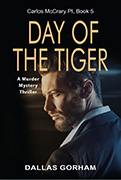Why James Patterson is one of the top-selling authors in the world
I just finished reading Invisible by James Patterson and David Ellis. Wow! What a ride.
One thing that made Invisible so special was that my copy was a gift from James Patterson himself. Now I can’t get a big head over this because Mr. Patterson also gave copies to about 300 of my fellow members of Mystery Writers of America who attended Sleuthfest 2015, the annual convention of the MWA, last February. Patterson was scheduled to give the keynote address. At the last minute, he had a family emergency which required him to cancel. So he sent 300 copies of his latest book to those of us who missed him, along with a letter which said, in part, “Your support means the world to me, and I would be thrilled to say thank you in person one day soon. Until then, I hope you’ll accept this book, Invisible, as a small token of my apology. Yours, J. Patterson”
Now, that’s a class act. Anyway, on to the book.
The opening paragraph grabbed me. “This time I know it. I know it with a certainty that chokes my throat with panic, that grips and twists my heart until it’s ripped from its mooring. This time, I’m too late.” Then, Invisible goes on for 397 more pages of murders, clues, mysteries, and thrills, culminating with an edge-of-your-seat climax and an “Ohmigawd!” plot twist at the very end.
The story is told in first person by Emmy Dockery, who took leave from her job as an FBI researcher to solve her own sister’s murder. The only problem is that the authorities insist that her sister’s death by fire was an accident.
One of the many things I enjoyed about the book is the feminine voice of the narrator. Patterson and Ellis did a great job of writing from a woman’s point of view. From the catty remarks about another woman Emmy was jealous of, to describing her break-up with another of the main characters, I felt like a woman was narrating. My own books are written from the viewpoint of a male private investigator and former Special Forces soldier. I don’t think I could write from a woman’s viewpoint like that. But Patterson and Ellis succeed. Maybe that’s one reason Patterson has sold over 280 million books.
About three chapters into the book I noticed another subtle feature that I hadn’t seen before—Invisible is written in the present tense. Emmy Dockery’s narration occurs as she studies the evidence, investigates the clues, and interacts with the other characters. The present tense gives the immediacy of solving the mystery alongside the heroine. Take this pivotal scene where Emmy proves that the fire was no accident:
Lia Janus [FBI forensic pathologist] looks around the room and releases a heavy sigh…
“I’ve conducted more than a thousand autopsies…,” she says. “I’ve… seen everything, guys. It’s impossible to surprise me.”
And? And?
“After examining the bodies of [two other victims], you can put me down as surprised,” she says.
I won’t give you the rest, because I don’t want to spoil the story.
Patterson and Ellis have another big winner in Invisible.

Every experienced writer has heard the advice to use action verbs. This also includes the advice to avoid adverbs and adjective. Instead, choose verbs and nouns that are more descriptive by themselves. For example, don’t say “She walked proudly down the street.” Say “She strutted down the street.” Don’t say, “He opened the car door quickly.” Say “He jerked the car door open.”
Most best-selling authors are masters of the action verb and the descriptive noun.
Take Lee Child for instance. Here’s an example of his from Chapter 33 of Die Trying, the second Jack Reacher novel: “The air force Bell put down on a gravel turnout two hundred yards south of where the road into Yorke narrowed and straightened into the hills. [emphasis supplied.]”
Mr. Childs could have said: “The air force helicopter landed on a gravel turnout two hundred yards south of where the road into Yorke dropped to two lanes and turned into the hills.”
But Child used more expressive verbs.
Here’s another example from the same chapter: “A random pattern of military vehicles slewed across the blacktop. [emphasis supplied.]” He could have said: “A random pattern of military vehicles sped across the blacktop.” But
Child used the more expressive “slewed.”
Another: “An officer slid out… saluted the General and skipped around to open all the doors. The five men squeezed in and the car turned again and rolled the two hundred yards north to the mess of vehicles.” Another writer might have said, “An officer got out… saluted the General and hurried to open all the doors. The five men got in and the car turned again and drove the two hundred yards north to the mess of vehicles.”
And note Child’s choice of “mess” for the grouping of vehicles. Even nouns can be made more descriptive without adding an adjective.
Small, insignificant differences? Small, yes. Insignificant, no. Small differences can turn a pretty good story into an excellent one.
Here’s an example from chapter 8 of Invisible, by James Patterson and David Ellis: “I pop awake, gasping for air, the dancing flames on the ceiling receding to a dark, quiet room. [emphasis supplied.]” The protagonist didn’t “wake suddenly”; she “popped.”
A good writer can even draft a noun like “bucket” and convert it to a verb. An example from chapter 1 of The Escape, by David Baldacci: “When the two rampaging fronts met…, the result was a storm of shattering proportions, with jagged lightning slicing sideways…, rain bucketing down….” I loved the use of “slicing” to describe the lightning.
Here’s how I used these principles in my third Carlos McCrary novel, Quarterback Trap:
Old: A green Mercedes approached the main garage exit.
Improved: A green Mercedes rolled to a stop at the garage exit.
Old: We waited until the last of the cars had driven off the ferry.
Improved: We waited until the last of the cars had bumped off the ferry.
Old: I started the engines, then called Flamer while they warmed up.
Improved: I cranked the engines, then called Flamer while they warmed up.
Old: The B-r-r-r-rap of automatic weapon fire came from the sun deck.
Improved: The B-r-r-r-rap of automatic weapon fire ripped from the sun deck.
Old: I closed the door behind the two Port City detectives….
Improved: I bolted the door behind the two Port City detectives….
Old: I picked up Pisarczik’s AK-47…. Improved: I grabbed Pisarczik’s AK-47….
Even staid, ordinary nouns can be punched up.
Old: The sound of Bob opening his bedroom door woke me.
Improved: The click of Bob opening his bedroom door woke me.
“Click” is more descriptive than “sound.” Exciting, expressive verbs and descriptive nouns add that extra oomph to writing.











